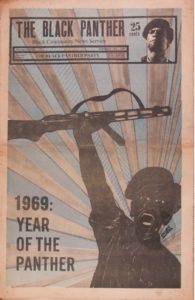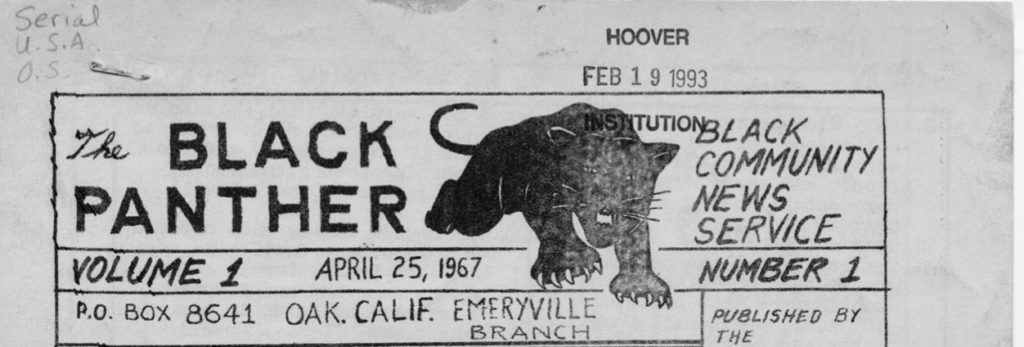 We are living in an era of unprecedented political passions on both ends of the spectrum. With emotions running high, voter participation in our democratic system has never been greater—as was clearly demonstrated by the 2020 presidential election. But what sort of a role do our emotions play in such political engagement? This was the question that Richard Norman decided to tackle in his senior thesis in Spring 2020. As a case study, he took a closer look at the Black Panthers and their rise to political prominence in the late 1960s and early 1970s. Amid the trying conditions and restrictions of the Covid-19 pandemic, Norman was able to make use of a digital archive of the Black Panther, a periodical published every week from 1966 to 1980. In its pages, Norman repeatedly encountered mention of two emotional discourses: anger and altruism. “These were two parallel emotional trends that got utilized for strategic purposes,” Norman said. “On the one hand, they harnessed the justified anger of their community to redress various grievances, while simultaneously promoting the ideal of altruistic behavior as a means of caring for that same community.”
We are living in an era of unprecedented political passions on both ends of the spectrum. With emotions running high, voter participation in our democratic system has never been greater—as was clearly demonstrated by the 2020 presidential election. But what sort of a role do our emotions play in such political engagement? This was the question that Richard Norman decided to tackle in his senior thesis in Spring 2020. As a case study, he took a closer look at the Black Panthers and their rise to political prominence in the late 1960s and early 1970s. Amid the trying conditions and restrictions of the Covid-19 pandemic, Norman was able to make use of a digital archive of the Black Panther, a periodical published every week from 1966 to 1980. In its pages, Norman repeatedly encountered mention of two emotional discourses: anger and altruism. “These were two parallel emotional trends that got utilized for strategic purposes,” Norman said. “On the one hand, they harnessed the justified anger of their community to redress various grievances, while simultaneously promoting the ideal of altruistic behavior as a means of caring for that same community.”
 Norman’s research led to a very important insight about the evolution of political movements. In short, while political engagement may be initiated by emotional responses to social and economic circumstances, effective political action tends make strategic and sophisticated use of those very same emotions as a form of political theater. “All human groups of all sizes create norms about emotional expression and how and when they should be felt,” Norman said. “Thinking of a political community as a type of emotional community allows us to view groups like the Black Panthers from a new perspective.” Throughout his research, Norman benefitted from close collaboration with faculty members in the History Department such as Christopher Petrella, who taught “From Black Power to Black Lives Matter,” and April Shelford, who taught a historiography seminar on the history of emotions. “Prof. Shelford was an immense help throughout the entire research process, and I would meet with her every two weeks to go over my research and ideas,” Norman recalled. “She was really helpful in teasing out things that were promising and pointing out which ones didn’t make much sense. This helped me to narrow my focus.”
Norman’s research led to a very important insight about the evolution of political movements. In short, while political engagement may be initiated by emotional responses to social and economic circumstances, effective political action tends make strategic and sophisticated use of those very same emotions as a form of political theater. “All human groups of all sizes create norms about emotional expression and how and when they should be felt,” Norman said. “Thinking of a political community as a type of emotional community allows us to view groups like the Black Panthers from a new perspective.” Throughout his research, Norman benefitted from close collaboration with faculty members in the History Department such as Christopher Petrella, who taught “From Black Power to Black Lives Matter,” and April Shelford, who taught a historiography seminar on the history of emotions. “Prof. Shelford was an immense help throughout the entire research process, and I would meet with her every two weeks to go over my research and ideas,” Norman recalled. “She was really helpful in teasing out things that were promising and pointing out which ones didn’t make much sense. This helped me to narrow my focus.”
With his AU degree now in hand, Norman plans to apply to Ph.D. programs in history, where he hopes to study the history of radical thought and politics in the United States during the twentieth century. He says that one possible direction will be to apply insights from his senior thesis at AU into an examination of the gay rights movement. “We might be able to learn how two very different political movements interacted with one another and made innovative use of the politics of emotions to achieve concrete political results.”